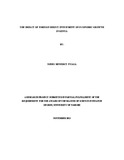| dc.description.abstract | The general benefits of foreign direct investment (FDI) for emerging economies are well
documented. Given the appropriate host-country policies and a basic level of development,
various studies show that FDI results in technology spillovers, enables human capital
formation, improves international trade integration, helps create a more competitive business
environment and improves enterprise development. All of these result in higher economic
growth, which is a crucial tool for alleviating poverty in developing countries. This study
explores the impact of foreign direct investment on the Kenyan economy using FDI and GDP
inflow data series from 1982 to 2012. The Statistical Package for Social Sciences was used to
analyse the data where descriptive analyses, frequencies and trend analysis, as well as
inferential analyses involving Analysis of Variance (ANOVA) and Correlation analysis to
establish relationships between the variables.
Graphical trend analysis of FDI and GDP reveals a direct positive relationship between the
two variables. The Pearson correlation was computed for GDP and FDI inflow data series
resulting in a correlation coefficient of 0.565 at the 0.001 (2 tailed) significance level which
indicates a strong positive correlation between the variables; this in turn means that there is a
significant direct proportional relationship between foreign direct investment and economic
growth in Kenya.
These findings have led to the conclusion that the impact of foreign direct investment on the
Kenyan economy is a positive one. As such, we can say that FDI promotes economic growth
and suggest that the Kenyan government embrace policies that aim to attract more foreign
direct investment while micro-managing the same to avoid the negative impacts of FDI on
local firms such as crowding out. | en |

